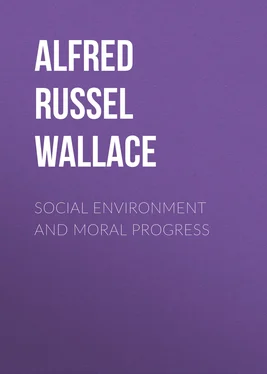Alfred Wallace - Social Environment and Moral Progress
Здесь есть возможность читать онлайн «Alfred Wallace - Social Environment and Moral Progress» — ознакомительный отрывок электронной книги совершенно бесплатно, а после прочтения отрывка купить полную версию. В некоторых случаях можно слушать аудио, скачать через торрент в формате fb2 и присутствует краткое содержание. Жанр: foreign_antique, sociology_book, на английском языке. Описание произведения, (предисловие) а так же отзывы посетителей доступны на портале библиотеки ЛибКат.
- Название:Social Environment and Moral Progress
- Автор:
- Жанр:
- Год:неизвестен
- ISBN:нет данных
- Рейтинг книги:5 / 5. Голосов: 1
-
Избранное:Добавить в избранное
- Отзывы:
-
Ваша оценка:
- 100
- 1
- 2
- 3
- 4
- 5
Social Environment and Moral Progress: краткое содержание, описание и аннотация
Предлагаем к чтению аннотацию, описание, краткое содержание или предисловие (зависит от того, что написал сам автор книги «Social Environment and Moral Progress»). Если вы не нашли необходимую информацию о книге — напишите в комментариях, мы постараемся отыскать её.
Social Environment and Moral Progress — читать онлайн ознакомительный отрывок
Ниже представлен текст книги, разбитый по страницам. Система сохранения места последней прочитанной страницы, позволяет с удобством читать онлайн бесплатно книгу «Social Environment and Moral Progress», без необходимости каждый раз заново искать на чём Вы остановились. Поставьте закладку, и сможете в любой момент перейти на страницу, на которой закончили чтение.
Интервал:
Закладка:
Alfred Russel Wallace
Social Environment and Moral Progress
PART I.—HISTORICAL
CHAPTER I
INTRODUCTORY
Before entering on the question of the relation of morality to our existing social environment, it will be advisable to inquire what we mean by moral progress, and what evidence there is that any such progress has occurred in recent times, or even within the period of well-established history.
By morals we mean right conduct, not only in our immediate social relations, but also in our dealings with our fellow citizens and with the whole human race. It is based upon the possession of clear ideals as to what actions are right and what are wrong and the determination of our conduct by a constant reference to those ideals.
The belief was once prevalent, and is still held by many persons, that a knowledge of right and wrong is inherent or instinctive in everyone, and that the immoral person may be justly punished for such wrongdoing as he commits. But that this cannot be wholly, if at all, true is shown by the fact that in different societies and at different periods the standard of right and wrong changes considerably. That which at one time and place is held to be right and proper is, at another time or place, considered to be not only wrong, but one of the greatest of crimes. The most striking example of this change of opinion is that as to slavery, which was held to be quite justifiable by the most highly civilised people of antiquity, and hardly less so by ourselves within the memory of persons still living. The owners of sugar estates in Jamaica cultivated by slaves were not stigmatised as immoral by their relatives in England or by the public at large; and it was the horror excited by the slave-trade in Africa, and in the "middle passage" on the slave ships, rather than by the slavery itself, that so excited public opinion as to lead to the abolition first of the one and then of the other.
We are obliged to conclude, therefore, that what is commonly termed morality is not wholly due to any inherent perception of what is right or wrong conduct, but that it is to some extent and often very largely a matter of convention, varying at different times and places in accordance with the degree and kind of social development which has been attained often under different and even divergent conditions of existence. The actual morality of a community is largely a product of the environment, but it is local and temporary, not permanently affecting the character.
To bring together the evidence in support of this view, to distinguish between what is permanent and inherited and what is superficial and not inherited, and to trace out some of the consequences as regards what we term "morality" is the purpose of the present volume.
CHAPTER II
MORALITY AS BASED UPON CHARACTER
Though much of what we term morality has no absolute sanction in human nature, yet it is to some extent, and perhaps very largely, based upon it. It will be well, therefore, to consider briefly the nature and probable origin of what we term "character"—in individuals, in societies, and especially in those more ancient and more fundamental divisions of mankind which we term "races."
Character may be defined as the aggregate of mental faculties and emotions which constitute personal or national individuality. It is very strongly hereditary, yet it is probably subject to more inherent variation than is the form and structure of the body. The combinations of its constituent elements are so numerous as, in common language, to be termed infinite; and this gives to each person a very distinct individuality, as manifested in speech, in emotional expression, and in action.
The mental faculties which go to form the "character" of each man or woman are very numerous, a large proportion of them being such as are required for the preservation of the individual and of the race, while others are pre-eminently social or ethical. These latter, which impel us to truth, to justice, and to benevolence, when in due proportion to all the other mental faculties, go to form what we distinguish as a good or moral character, and will in most cases result in actions which meet with the general approval of that section of society in which we live; and this approval reacts upon the character so that it often appears to be better than it really is.
So great is the effect of this approval of our fellows that it sometimes leads to behaviour quite different from what it would be if this approval were absent. This is especially the case when the approval leads to wealth or positions of dignity or advantage. Occasionally, in cases of this kind the individual cannot resist his natural impulses, and then acts so as to show his underlying real character. We term such persons hypocrites for making us believe that they were inherently good, instead of being so in appearance only when the good action was profitable to them. Hence in a highly complex state of civilisation it becomes exceedingly difficult correctly to appraise characters as moral or immoral, good or bad; while there is no such difficulty as regards the intellectual and emotional aspects of character, which are less influenced by the general environment, and which there is less temptation to conceal.
All the evidence we possess tends to show that although the actions of most individuals are to a considerable extent determined by their social environment, that does not imply any alteration in their character. Everyone's experience of life, and especially the example of his friends and associates, leads him to repress his passions, regulate his emotions, and in general to use his judgment before acting, so as to secure the esteem of his fellows and greater happiness for himself; and these restraints, becoming habitual, may often give the appearance of an actual change of character till some great temptation or violent passion overcomes the usual restraint and exhibits the real nature, which is usually dormant.
Now it is this inherent and unchangeable character itself that tends to be transmitted to offspring, and this being the case, there can be no progressive improvement in character without some selective agency tending to such improvement. By means of a general discussion of the nature and origin of "Character," I have elsewhere shown that there is no proof of any real advance in it during the whole historical period. 1 1 See Character and Life , edited by P. L. Parker, pp. 19-31. (Williams and Norgate; November, 1912.)
I show later on what the required selective agency is, and how it will come into action automatically when, and not until, our social system is so reformed as to afford suitable conditions. ( See Chapter XVI Конец ознакомительного фрагмента. Текст предоставлен ООО «ЛитРес». Прочитайте эту книгу целиком, купив полную легальную версию на ЛитРес. Безопасно оплатить книгу можно банковской картой Visa, MasterCard, Maestro, со счета мобильного телефона, с платежного терминала, в салоне МТС или Связной, через PayPal, WebMoney, Яндекс.Деньги, QIWI Кошелек, бонусными картами или другим удобным Вам способом.
.)
CHAPTER III
PERMANENCE OF CHARACTER
I will now call attention to a few of the facts which lead to the conclusion as to the stationary condition of general character from the earliest periods of human history, and presumably from the dawn of civilisation. In the earliest records which have come down to us from the past we find ample indications that general ethical conceptions, the accepted standard of morality, and the conduct resulting from these, were in no degree inferior to those which prevail to-day, though in some respects they differed from ours.
Читать дальшеИнтервал:
Закладка:
Похожие книги на «Social Environment and Moral Progress»
Представляем Вашему вниманию похожие книги на «Social Environment and Moral Progress» списком для выбора. Мы отобрали схожую по названию и смыслу литературу в надежде предоставить читателям больше вариантов отыскать новые, интересные, ещё непрочитанные произведения.
Обсуждение, отзывы о книге «Social Environment and Moral Progress» и просто собственные мнения читателей. Оставьте ваши комментарии, напишите, что Вы думаете о произведении, его смысле или главных героях. Укажите что конкретно понравилось, а что нет, и почему Вы так считаете.












